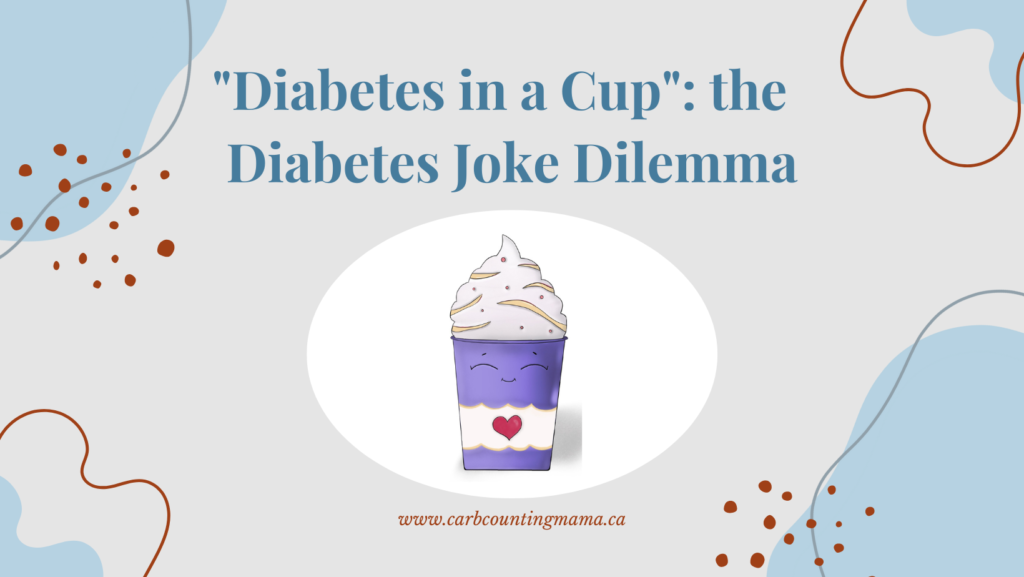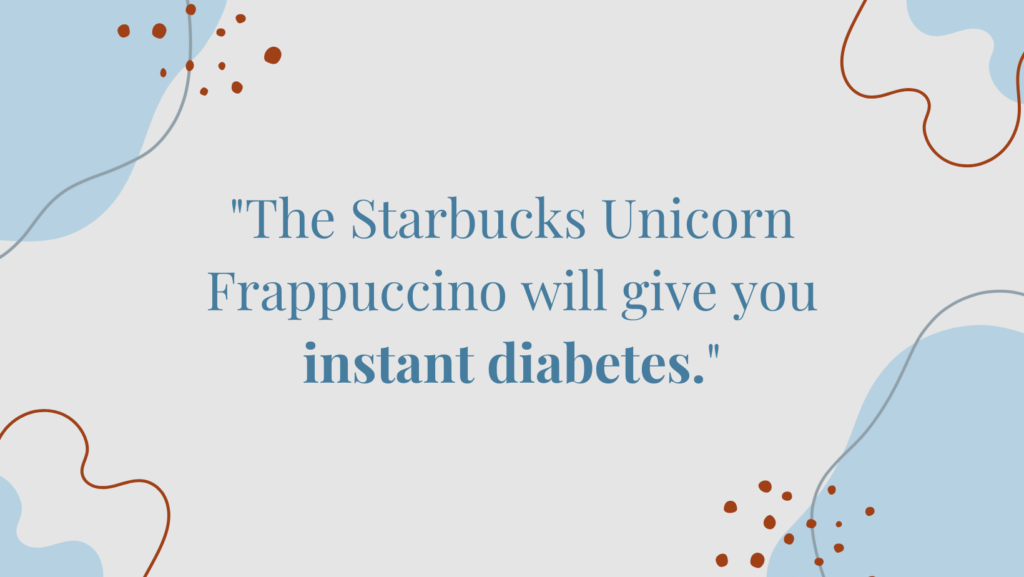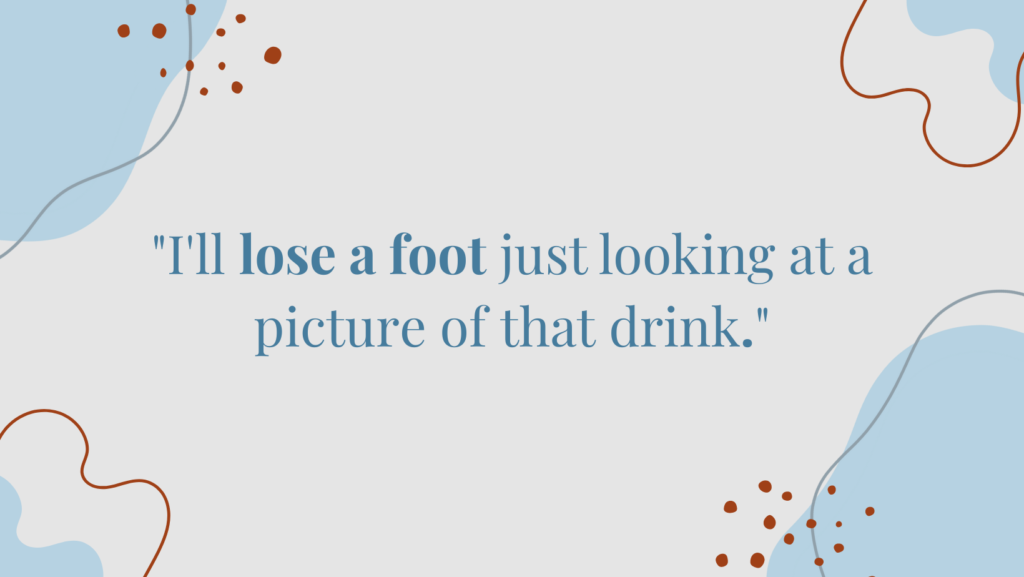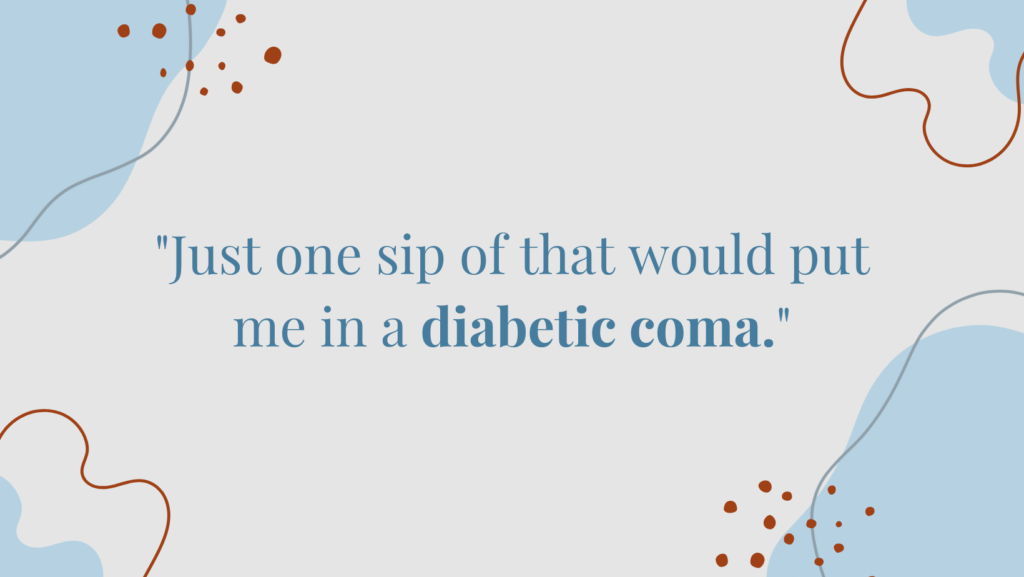Imagine for a moment, you and I are at the beach. We go swimming in the ocean. We’re having a great time splashing and laughing. All of a sudden, I scream. We get out of the water and you see red marks on my leg. I’ve been stung by a jellyfish! Quick, what would you do? (Stay with me here… we’ll talk about diabetes in a cup jokes in a moment).

Diabetes jokes are everywhere
They’re simple. Everyone makes them. They’re usually good for a quick laugh.
You hear them on the radio. You see them in movies and on TV. Heck, you even have friends or family members who like to bust out a diabetes joke whenever there’s “junk” food around.
But, should we really be telling “diabetes in a cup” or “diabetes on a plate” jokes?
Back in the summer of 2017…
Starbucks released its limited time only, new Unicorn Frappuccino. Everyone was talking about the pink and blue “magical” drink. Then, the diabetes jokes came flooding in.
Suddenly, my social media was covered in “diabetes in a cup” memes.
Among my favorite comments:
Many choose the basic diabetes joke…

While others aim for shock value…

And as if that wasn’t quite serious enough for you…

When the Starbucks Unicorn Frapp was announced, “diabetes in a cup” jokes flooded the internet. But, these jokes didn’t start or end with the infamous pink and blue drink.
They’re everywhere, especially around the holidays. Halloween candies? Diabetes joke. Holiday desserts? Diabetes on a plate. Extra serving of dinner at a family gathering? You’ll give yourself diabetes.
These “jokes” are funny to many people because society deems it ok to make fun of diabetes and people with diabetes. After all, they brought it on themselves, didn’t they? If only they’d put down the donuts and frappuccinos they’d be fine… right?
What the average person thinks about diabetes:
- People with diabetes are overweight and don’t exercise
- People with diabetes are middle-aged
- Diabetes is caused by eating a poor diet
- People with diabetes can’t eat sugar or sweets
- Diabetes can be cured by eating better and exercising more
This is what we have been taught. We learn it from TV, the internet, friends, and family. Even as a child, I had many of those ideas in my head. I honestly couldn’t tell you where they came from… but they’re wrong.
Facts about Type 1 diabetes:
- The cause of type 1 diabetes is unknown, but it is largely believed to be a genetic predisposition that is triggered by a virus or trauma. The onset of type 1 diabetes can be triggered and diagnosed at any age. Adults and children alike are diagnosed with T1D every day.
- Type 1 diabetes is an auto-immune disease. The immune system mistakenly attacks insulin-producing cells in the pancreas. The body can no longer produce its own insulin.
- Insulin is necessary for survival. A person with type 1 diabetes has to inject insulin multiple times a day (either via syringe, pen needle, or pump) or they will die.
- Type 1 diabetes does not discriminate. People with type 1 diabetes can be any age, size, weight, nationality, or social class.
- Type 1 diabetes is a lifelong disease. People do not outgrow it and changing their diet or exercise regime will not make it go away… ever.
- People with type 1 diabetes can eat what anyone else eats. The difference is that they have to manually provide their body with insulin to work with the food, rather than having their pancreas do it for them like people without diabetes. Sometimes, they even NEED sugar like juice or candy to treat a low blood sugar. Without this sugar, they could possibly have a seizure or slip into a coma. (This is a diabetic coma… in case you were wondering.)
I know what you’re thinking…
What’s the big deal with making a joke about diabetes in a cup? These jokes are obviously not about type ONE diabetes. No one would make fun of a disease that causes little kids to need multiple needles a day just to stay alive. No one is poking fun at a child who was actually in a diabetic coma. (Except maybe the people who said the drink was going to put them in a diabetic coma??)
This is about type TWO diabetes. Type 2 diabetes is ok to make fun of.
But, is it?
Some facts about type 2 diabetes:
- Type 2 diabetes is a metabolic disease. For many different reasons, the pancreas either doesn’t make enough insulin or the body doesn’t utilize it efficiently.
- There is a strong genetic component in type 2 diabetes. You can eat healthy foods, be a healthy weight, and exercise regularly and still get type 2 diabetes.
- Type 2 diabetes doesn’t get cured by diet and exercise. The pancreas is still not functioning optimally, but a certain diet and exercise regime can sometimes reduce the stress on the pancreas enough that symptoms subside. Changing that diet or exercise regime at any point will cause increased stress on the pancreas again and symptoms will likely reappear.
“Diabetes in a Cup” jokes have taught us…
We have learned that diabetes is a disease that you can prevent and therefore, people who have diabetes brought it on themselves and are fair game to make fun of.
We are told it’s ok to shame people about diabetes and that it’s funny because it’s not a serious disease and if people really wanted, they could reverse their diabetes and be cured.
So, when many people see a diabetes joke, they laugh. And then they share it.
Whether it’s a meme on the internet, a joke on a television show, or a punchline on the radio, these jokes continue to spread misinformation about diabetes.
Come on, it’s just a joke.
I hear ya. You’re not a doctor. That show isn’t a documentary. That cartoon doesn’t need to be medically accurate. No one is learning from these jokes. Everyone KNOWS it’s just a joke.
Except they don’t. That’s not how our brains work. We take in information from various sources and our brain files it away accordingly. The more times you hear the same information, the more likely it solidifies as a fact in your mind. It doesn’t matter that you saw it in a meme or a cartoon. If the brain decides it’s believable, it believes it.
Don’t believe me?
Back to the jellyfish sting.
When we were having our hypothetical beach day and I got stung by the jellyfish, what did you do to help me? I bet that at least momentarily, you thought that peeing on the sting would help. Didn’t you?
I have news for you. Not only does urine NOT help a jellyfish sting, but you learned that “fact” from a rather un-scientific place.
Either directly or indirectly, you learned about peeing on a jellyfish sting from… wait for it… Joey Tribbiani (from the 90s sitcom: Friends).
That’s right. The solution to our beach day problem came to you not only from a TV comedy but from the character who is commonly considered to be the least intelligent of the group.
And do you know why you believed Joey? Because he mentioned learning this “fact” from the Discovery channel.
To be clear
I’m not saying the unicorn frappuccino is healthy. I’m not recommending drinking one. There IS a lot of sugar in them (as there is in ANY frappuccino ANYWHERE by the way).
I think people should try to eat healthy. Everything in moderation. Make reasonable food choices. Try to have a healthy relationship with food in general. But that’s EVERYONE, not just people with diabetes.
Want to compare a frappuccino to 3 full-sized Snickers bars? Go for it. It’s kind of gross, I agree.
Want to say that too much sugar is not healthy, that the number of calories is super high and you’re wasting a quarter or a third of your day’s caloric intake on a drink? Be my guest.
I’m with you. I don’t like drinking my calories or carbs. I think we should try to aim for more nutrient-dense foods as often as we can.
Diabetes jokes have an impact
It may get a laugh or two, but much more importantly, it spreads misconceptions about diabetes. It encourages people to disease shame. And whether you’re “just joking” or not… people will learn from your jokes.
So, the next time you want to make a diabetes joke, please don’t.
And never, ever try peeing on the jellyfish sting!
~ Leah
Have you heard diabetes jokes like these? Did you think that way before diagnosis? Let’s chat about it in the comments!
For more tips and stories about T1D, join the Carb Counting Mama email list, and make sure to head over to the Carb Counting Mama Facebook page and “like” it.
Great article, thanks for sharing!
Thank you so much Brit!
Well written with important facts, and I will share it with the masses! Just the other day the TV show American Housewife made a comparision of a ‘candy’ birthday party to Type2 Diabetes which as you state doesn’t make it okay just because they think they are differentiating between Type 1 and Type 2! Where is the EQ and COMPASSION?! Shame on them!
Hi Julie, I heard about that episode, even though I don’t watch the show. (Things like that get around in the DOC don’t they??) There is very little compassion, empathy, or understanding when it comes to diabetes, either T1 or T2. Maybe if we point that out enough, one day there will be!
I’m curious where you got that T1D is caused by “emotional trauma at any point during the person’s life”. Hadn’t heard any scientific data supporting that.
Thanks for fighting the good fight! Diabetes, whether T1D or T2D is never a joking matter!
Melissa
T1D mom to Katie, dx 8/2011 at age 11
Hi Melissa,
I think part of that may have been the wording I used. I’m going to edit it a bit to make it less confusing. But I’ll answer here as well. The “at any point during the person’s life” was referring to the fact that you can develop T1D at any age (not just kids). As for the emotional trauma, it is a newer point that has come up in recent studies that stress and emotional trauma may be potential triggers (not the cause, mind you) for T1D. Here are a few articles about it if you want to check it out: Stress – Diabetes and the Environment, Trauma May be an Important Cause of Type 1 Diabetes (the author uses the word cause, not my wording), and Early Trauma “triples” risk of Type 1 diabetes. I hope that helps to answer your question.
All the best to you and Katie!
Excellent posting and I will be holding on to your arguments to use elsewhere whenever similar remarks are made.
Thank you John.
Thank you for the educational post. Sometimes I get aggravated and rant instead of providing educational info. The recent ‘diabeetus’ posts from people have been ridiculous. I’m hoping people took the time to read this article when I shared it.
Hi Missy,
Thanks for sharing! I sometimes find that rather than ranting or educating, I freeze. I get so stunned by what the person says, it’s like my brain can’t comprehend it. On the other hand, I have found that even if people don’t “like” or comment when you share something like this, people are paying attention. You may be surprised by how many people do read what you post about T1D. A lot of them just don’t know what to say about it once they’ve read it (maybe they have my “freeze” problem).
Leah